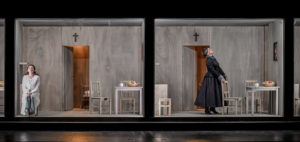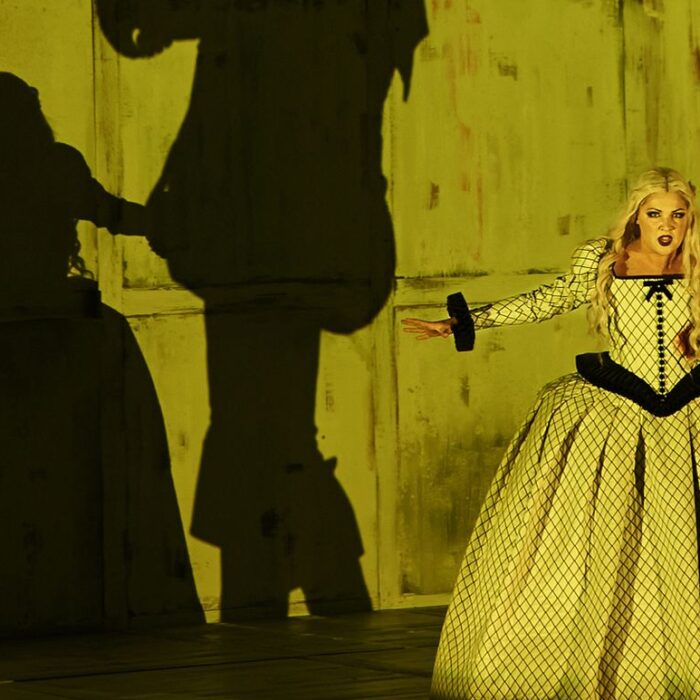
Brno Janacek Festival 2020 Review: Jenůfa
Matilla Leads a Strong Cast In Glaser’s Imaginative Production
By Alan Neilson(Photo: Marek Olbrzymek)
Superficially “Jenůfa” is a tale of village life, full of folk traditions and colorful costumes, of a close intimate community in which all participate in each other’s daily lives and activities. Sure bad things happen, as they do everywhere, people fall out, they fight and argue and occasionally even murder, but the underlying harmony and all round goodness of the rural community, steeped in its traditions is supportive and functions for the common good. The reality of Janacek’s opera, however, is quite the opposite. The intimate community is claustrophobic, it intrudes and oppresses, it is brutal and intolerant, forcing people to commit heinous acts such as the Kostelnička’s killing of Jenůfa’s baby, while its folksy traditions and communal values provide a superficial gloss of feigned harmony and a place of refuge for the consciences of the intolerant mob.
An Uneven Production
The production for Brno’s Janacek Festival, directed by Martin Glaser and conducted by Marko Ivanović, was however only partially successful in exposing the community’s small-minded hypocrisy as the fundamental driver in the murder of Jenůfa’s baby. The main problem was Ivanović’s interpretation, which tended towards the sentimental; it was fresh, it was vibrant, he successfully uncovered the score’s textures and captured the work’s lyricism in what was a beautiful performance from the orchestra. But it was too pleasant, too light, there was little sense of the claustrophobia, pain and menace which underpin the work.
By contrast, Glaser was keen to explore the dichotomy which exists between the superficial and the underlying reality. In Act one, along with scenographer Pavel Borák and costume designer Markéta Sládečková’s, he took advantage of every possible opportunity to emphasize the rural environment and its folk traditions. Although the stage design was fairly crude, relying on cloth facsimiles of trees, it was nevertheless a colorful staging with apples strewn across the stage and piled up in baskets. Everyone was dressed in traditional folk costume. The autumnal lighting cast a warm glow over the stage. Laca’s argument with Jenůfa which ends with him slashing her face could therefore easily be seen as just an aberration. In Act two, however, the stage changes into a metaphorical expression of the characters isolation, their disconnectedness. There were a series of small claustrophobic rooms, all identical, down to the position of the chairs and the crucifix on the wall. When the door of one room opened or closed, it did so in all the rooms. The characters were isolated in different rooms, their interactions rarely face to face, trapped in their own reality, talking past each other. There was no sense of any support offered by the community, only fear of its judgment.
The sharp contrast between the first two acts not only successfully captured the contradiction between the superficial and the real, but highlighted the personal suffering of the characters, especially that of the Kostelnička, who even in the first act is isolated, depicted as a person who is quite willing to cast the first stone, rigidly committed to the community’s moral values. During the festivities she sits alone dressed in black, separate from the others while sitting in the middle of them.
Act three suffered from an awkward set design with the central part of the stage looking like the frame or a wooden crate, the only reason for its existence appearing to be as a means of removing the cast from stage, as it disappeared below, leaving Jenůfa and Laca alone. It was ugly, and out of keeping with Sládečková’s wonderful purple and dark green folk costumes and Martin Špetlík’s well designed lighting.
A Starry Cast
Although Karita Mattila’s star status ensured her top billing, the principal singers were no less effective. Soprano Pavla Vykopalová in the title role was an engaging and sympathetic Jenůfa. She has an appealing voice with an attractive timbre, a rich middle voice with a bright, secure upper register. Her beautifully rendered phrasing captured the lyrical quality of the part, although this was not at the expense of Jenufa’s inner pain and suffering. Her vocal versatility and ability to expertly develop characterization were impressive which was wonderfully illustrated in her Act two monologue, “Mamičko, mám težkou hlavu, mám, mám,” in which she runs through a string of emotions, as she searches for her mother, then her baby, anxiously awaits Steva’s arrival, panics and worries over the baby’s whereabouts and prays for her child’s safety.
Matilla’s familiarity and success in the role of the Kostelnička is well-known, and she did not disappoint in this production. From the moment she strode onto the stage amidst general frivolity towards the end of Act one, the strength of her portrayal dominated the stage, her distance from the rest of the community clearly visible: she is respected, even feared, but not liked. The irony of course is that her actions are a result of the fact that she is fully immersed in, and committed to its values, its prejudices, and judgements. Vocally, Matilla was not at her best in Act one, but in the crucial second act she rose to the occasion with a dramatically powerful performance, capturing the Kostelnička’s determination, ruthlessness and concerns, as well as her inner fears. The more extreme her emotions, the more compelling her performance became. It was an expressive performance founded upon her secure technique and deep knowledge of the role. Every line was crafted in detail to reflect her complex and increasingly unstable mental state, with dynamic nuances, subtle coloring and accenting all carefully wrought, and as her emotions become increasingly manic so the voice rose and shifted rapidly, spiraling and convulsing before she collapsed onto the floor in a splendid conclusion to Act two.
In Act one, tenor Peter Berger’s Laca was a largely unattractive, vicious character, with little sign of the love he is supposed to hold for Jenůfa, but with plenty of ego and insecurity, certainly not a man at ease with himself. It was a characterization which lacked nuance. However, over the following two acts he transformed into a more balanced individual so that by the end his love was genuinely depicted. It was an interpretation, which by chance or by design, highlighted the impression of man who had matured, who has seen the error of his ways and has been redeemed by love. He put in a strong singing performance, his voice secure and versatile, his phrasing well-crafted.
Richard Samek produced a forceful presentation as Steva. His possesses an even-toned, balanced and well-supported voice which he employed with skill. He moved with ease and strength into the upper register, whilst maintaining its quality and accented the vocal line intelligently, successfully capturing the character’s passionate, yet unpleasant, irresponsible nature, one interested only in his own pleasures. His singing was matched by a strong acting performance; his depiction of Steva’s drunken arrival after having just avoided the draft was particularly convincing.
There are numerous minor roles, all of which were essayed successfully, although a number of performances did catch the eye. Mezzo-soprano Jitka Zerhauova, cast as Grandmother Buryjovka, had a strong, likable stage presence. Her well-supported voice has a distinctive sound, which she used skillfully to characterize the role. Possessing a warm, full-sounding bass, Jirí Sulženko produced a confident, finely sung and detailed performance in the role of the Mill Foreman, for which he received loud applause at the final curtain. The bass Ladislav Mlejnek produced a larger-than-life, colorful presentation as the Mayor.
Overall this was a production with much to commend. Glaser’s direction was incisive, it had a good pace and successfully exposed the vicious elements which lay beneath the seemingly harmonious society. Sládečková’s wonderful folk costumes certainly impressed, although Borák’s staging was a bit hit and miss. On the musical side, the singers were excellent, but Ivanovic’s interpretation, although beautifully played, never fully caught the claustrophobia or sense of menace which underlies the narrative. At the end, Jenůfa and Laca are reconciled and walk off in loving harmony as the rain pours down, although they did not get wet! A perfect metaphor for Ivanović’s reading.



